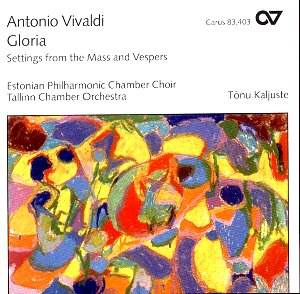I liked this disc in
every respect but one. The tempos are
buoyant, the solo singing exceptionally
attractive, the chamber orchestra lithe
and incisive, the direction idiomatic.
The problem is the choir or, rather,
the way in which it’s been recorded.
The acoustic balance in the Choruses
of the Gloria sounds very weird indeed
– with what sounds like a massive chorus
(in the booklet picture I counted twenty-seven)
in a vast nave amorphously recorded
against a bright and fluent but small
chamber band. I know Estonian choirs
have a reputation for making a big sound
but really the effect at such moments
is ruinously dichotomous.
This is frustrating
because I found a great deal to admire,
from the intelligence and creamy tones
of the two excellent sopranos Karla
Urb and Vilve Hepner – whose blend is
admirable – to the orchestral obbligato
playing (sample Domine Deus for
a particularly fine example) and the
forward moving but not indifferent playing
of the Tallinn Chamber Orchestra under
Kaljuste’s judicious direction. If I
can find fault with them it lies in
the disjunction between the rhythmic
attention of the band and the rather
overly legato phrasing of the choir
– which sets up another of those disjunctions
to which the disc seems prey.
If the other works
were recorded on different days or if
the microphone set up was changed it
somehow seems to matter less in the
other works. The Kyrie, Credo and Magnificat
sound less problematical acoustically
though there is still the disparity
in aesthetic between players and singers.
I liked the expressive depth of the
Credo’s Et incarnates est
and the Et misericordia from
the Magnificat. Again solo singing is
fine. In the end though I was never
able to reconcile the more problematical
nature of the recording.
Jonathan Woolf
